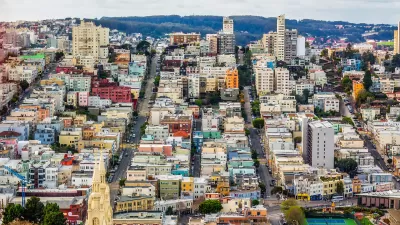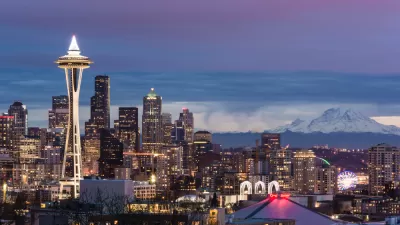Twitter’s move into San Francisco this month is part of a new trend of tech companies setting up in the city, causing rents to skyrocket, and forcing lower-income residents out.
A different kind of gold rush is hitting San Francisco. But instead of golden nuggets, entrepreneurs are looking for office space.
Norimitsu Onishi reports that tech companies, such as Twitter, are repositioning their headquarters in the middle of the city, bringing with them jobs and gentrification. But the pull away from Silicon Valley brings young workers along with it, raising residential rents and putting at risk, "the very qualities that have drawn generations of outsiders here, like the city's diversity and creativity. Families, black residents, artists and others will increasingly be forced across the bridge to Oakland, they [critics] warn."
"If you have a city that is wall to wall with tech workers, that might be really cool from a tech worker's standpoint," said Peter Cohen, director of the San Francisco Council of Community Housing Organizations, a private group representing nonprofit housing developers. "But that is not the kind of rich diversity of population that makes San Francisco the place that it is."
While Mayor Edwin Lee, who has aggressively courted the start-ups, "recently proposed creating a housing trust to finance affordable housing for the next thee [sic] decades,...It is not clear whether the trust - which must be approved by the Board of Supervisors and voters in a vote in November - will become reality, much less what effect it will have over decades."
Thanks to Akemi Leung
FULL STORY: New San Francisco Tech Boom Brings Jobs but Also Worries

Planetizen Federal Action Tracker
A weekly monitor of how Trump’s orders and actions are impacting planners and planning in America.

Map: Where Senate Republicans Want to Sell Your Public Lands
For public land advocates, the Senate Republicans’ proposal to sell millions of acres of public land in the West is “the biggest fight of their careers.”

Restaurant Patios Were a Pandemic Win — Why Were They so Hard to Keep?
Social distancing requirements and changes in travel patterns prompted cities to pilot new uses for street and sidewalk space. Then it got complicated.

Platform Pilsner: Vancouver Transit Agency Releases... a Beer?
TransLink will receive a portion of every sale of the four-pack.

Toronto Weighs Cheaper Transit, Parking Hikes for Major Events
Special event rates would take effect during large festivals, sports games and concerts to ‘discourage driving, manage congestion and free up space for transit.”

Berlin to Consider Car-Free Zone Larger Than Manhattan
The area bound by the 22-mile Ringbahn would still allow 12 uses of a private automobile per year per person, and several other exemptions.
Urban Design for Planners 1: Software Tools
This six-course series explores essential urban design concepts using open source software and equips planners with the tools they need to participate fully in the urban design process.
Planning for Universal Design
Learn the tools for implementing Universal Design in planning regulations.
Heyer Gruel & Associates PA
JM Goldson LLC
Custer County Colorado
City of Camden Redevelopment Agency
City of Astoria
Transportation Research & Education Center (TREC) at Portland State University
Camden Redevelopment Agency
City of Claremont
Municipality of Princeton (NJ)





























